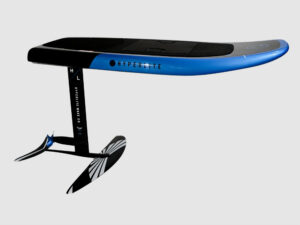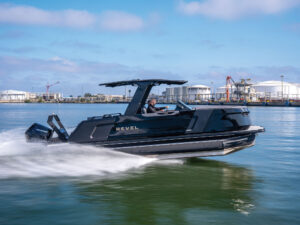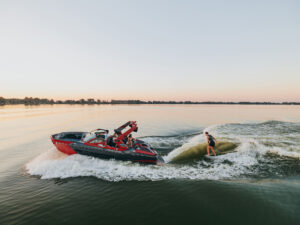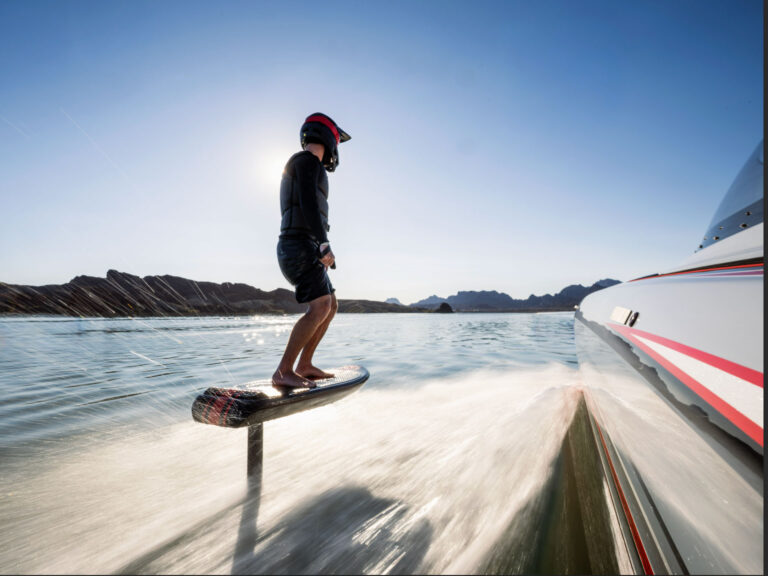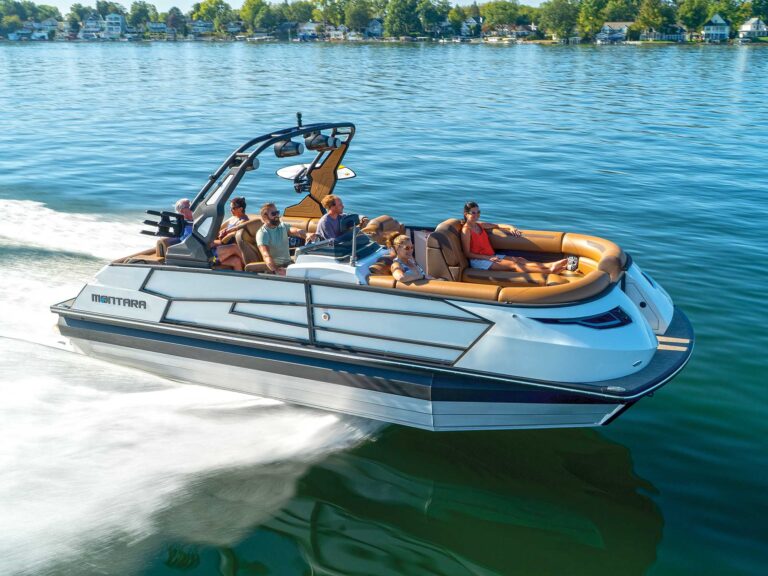
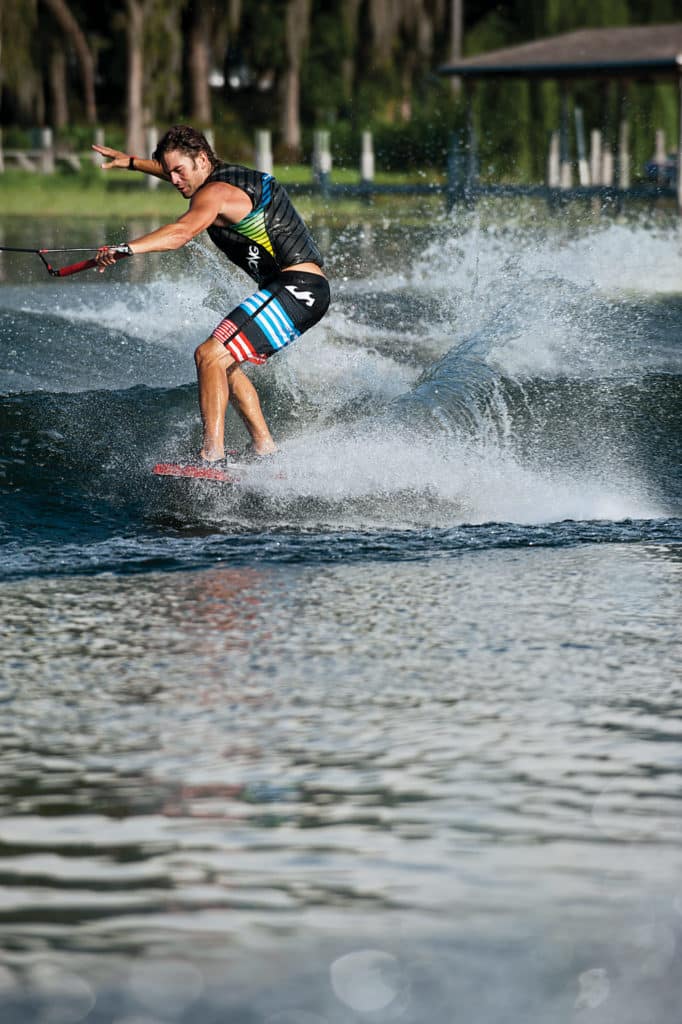
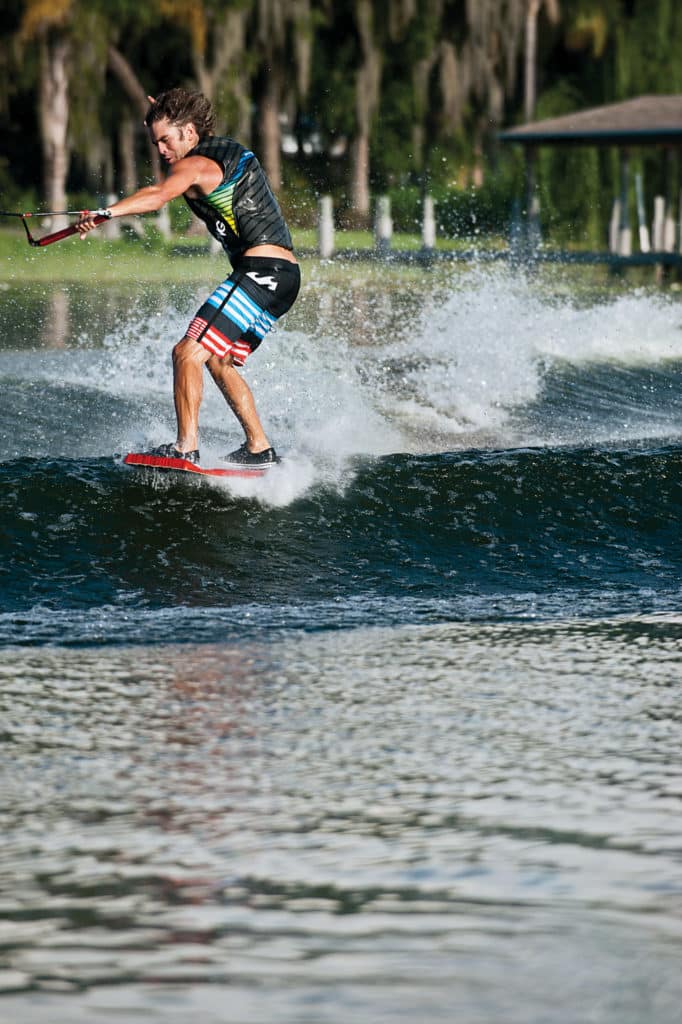
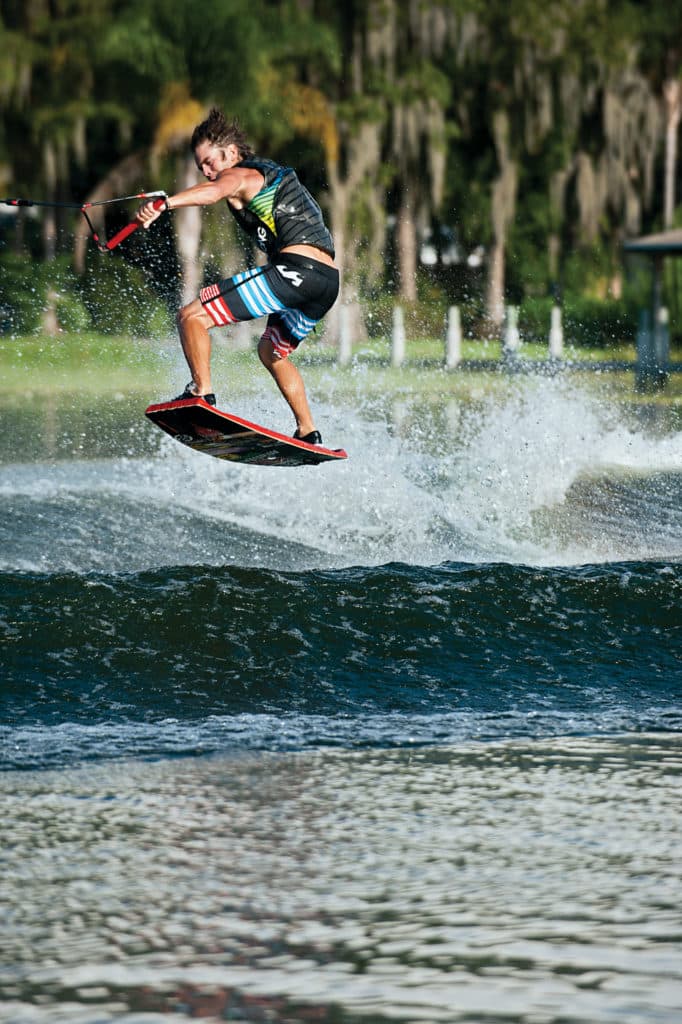

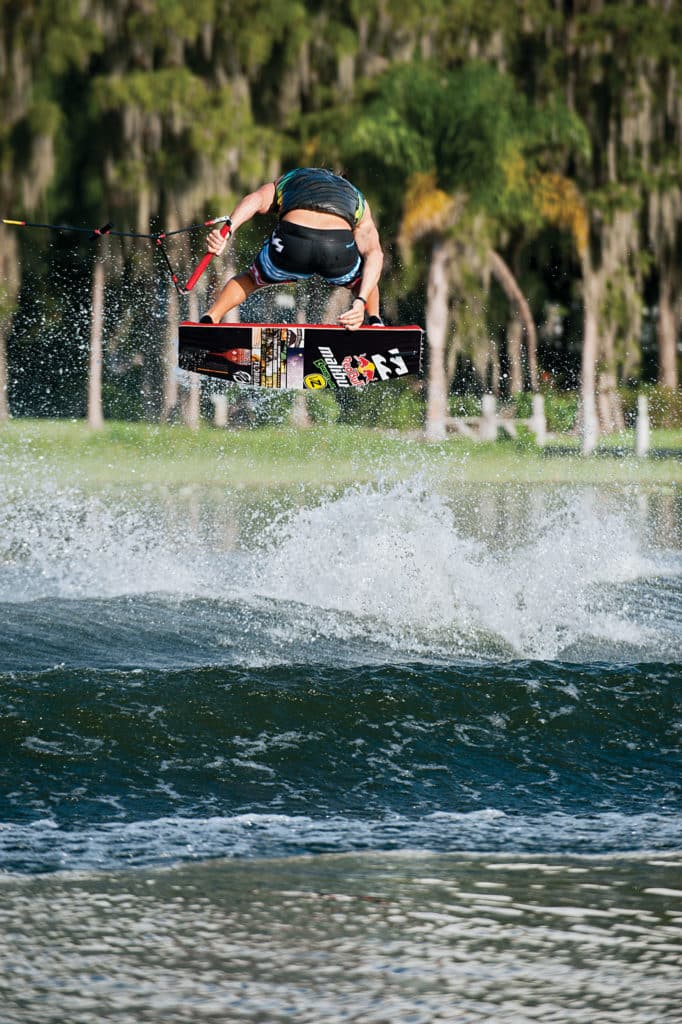
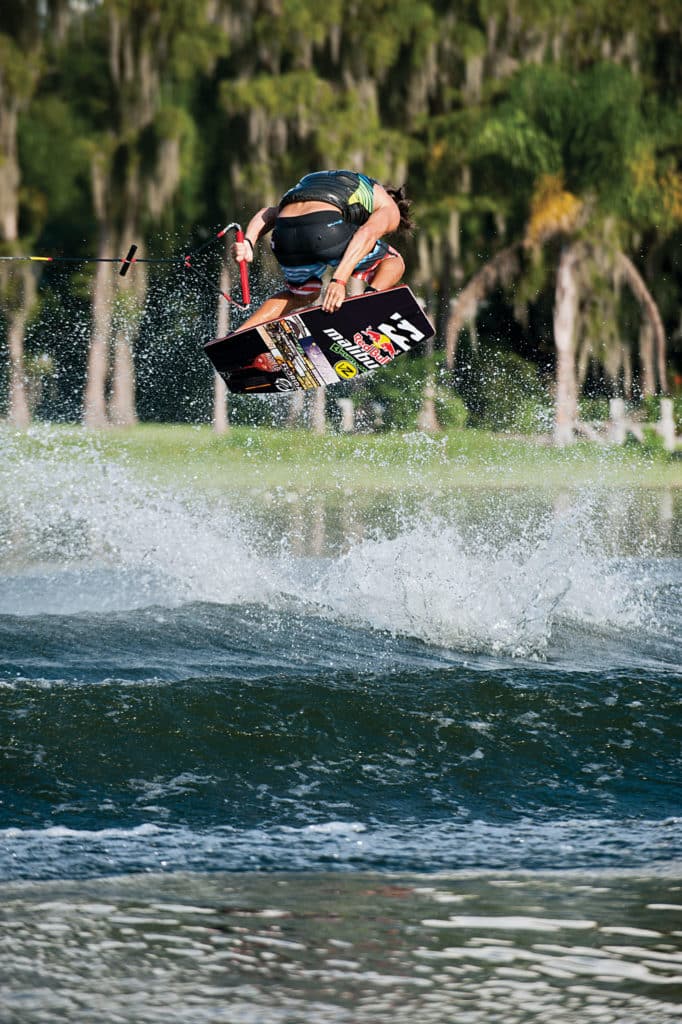
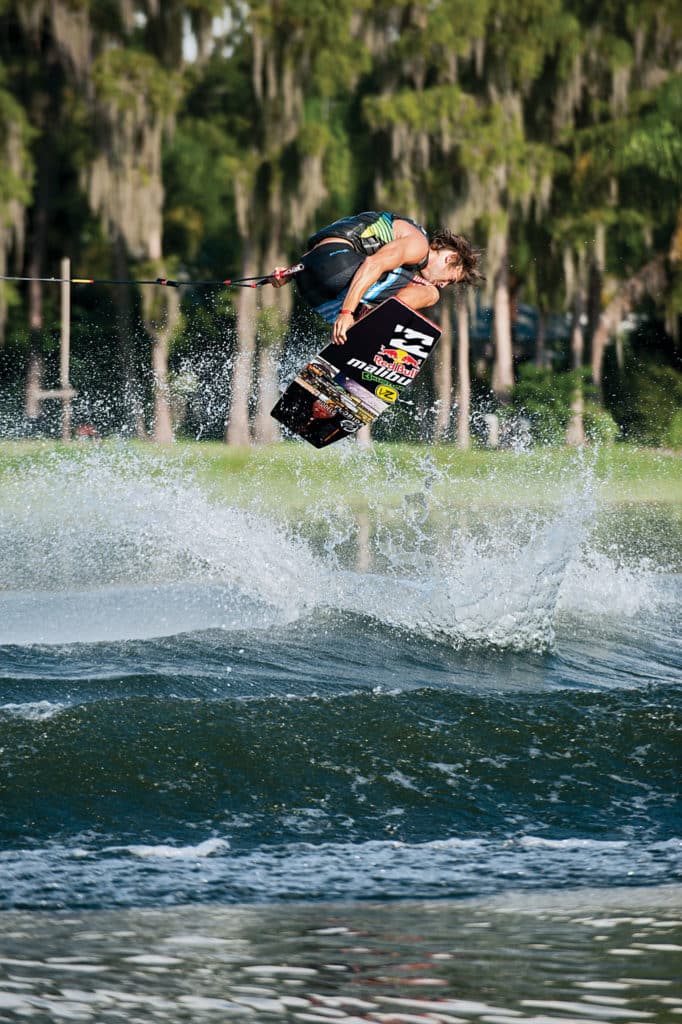
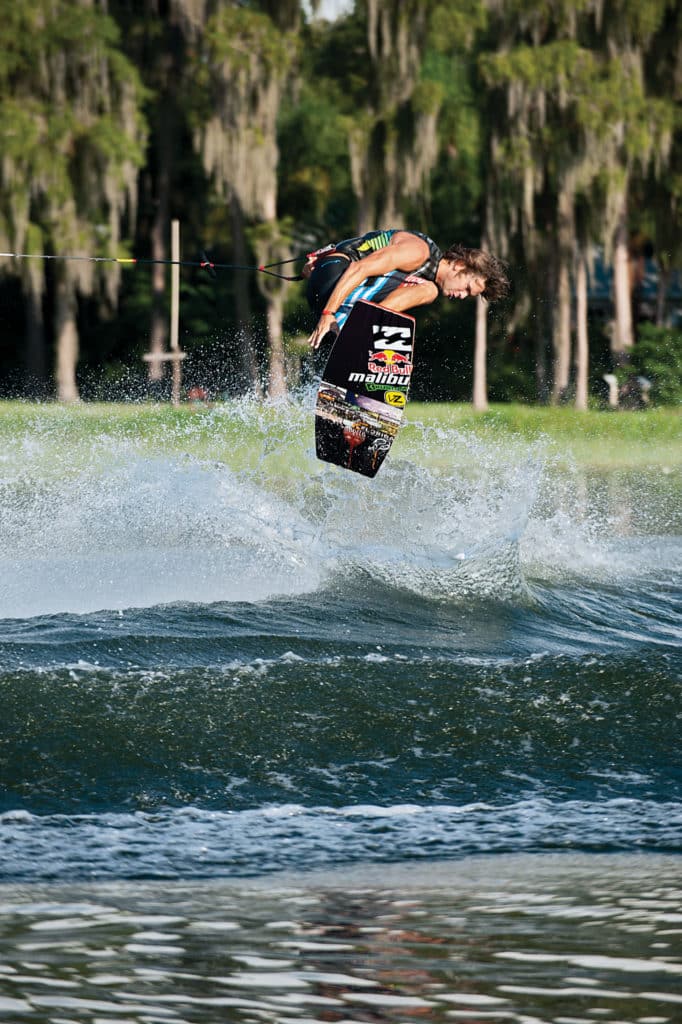
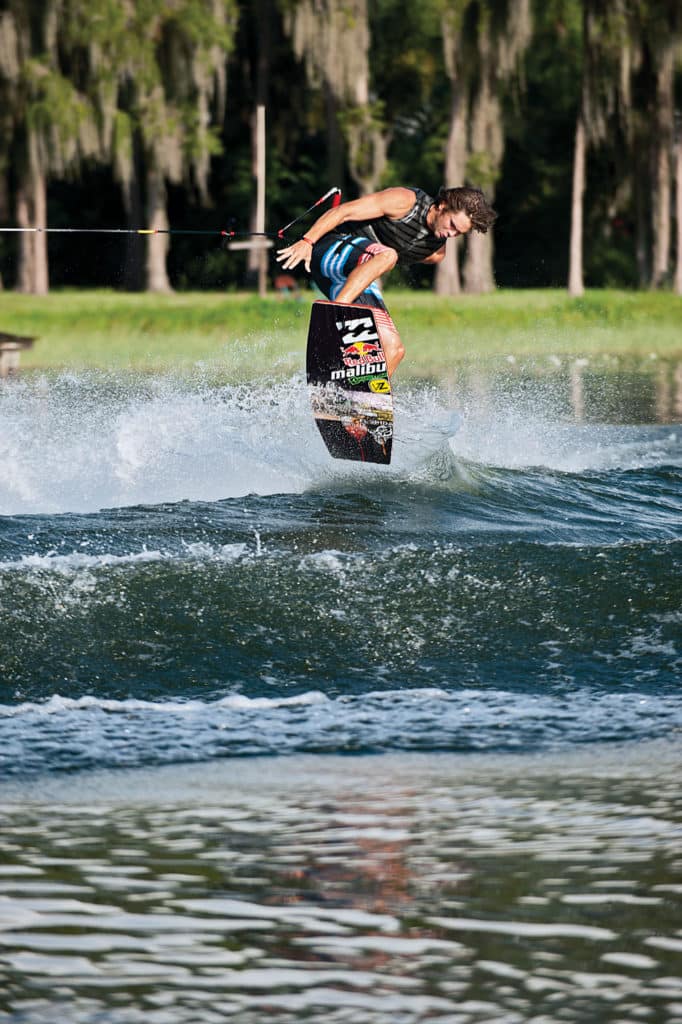
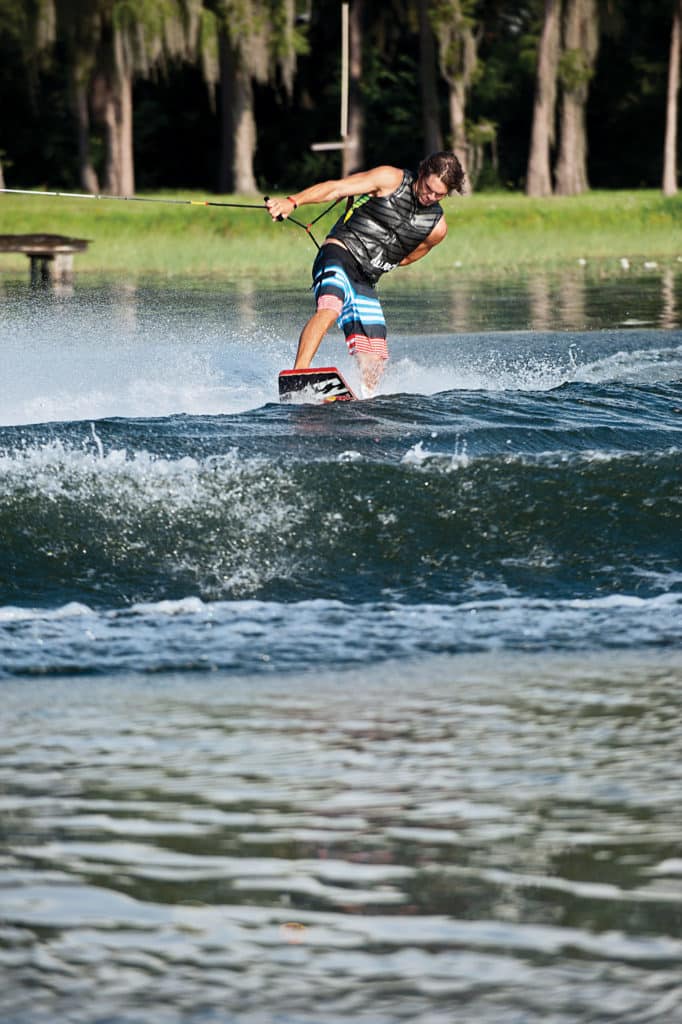
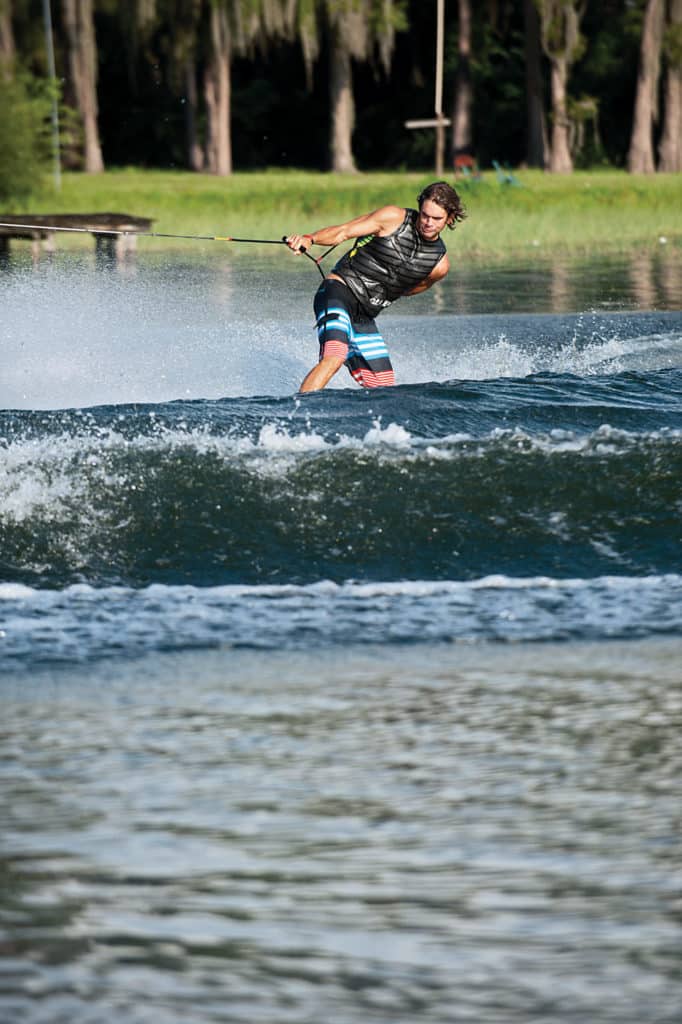
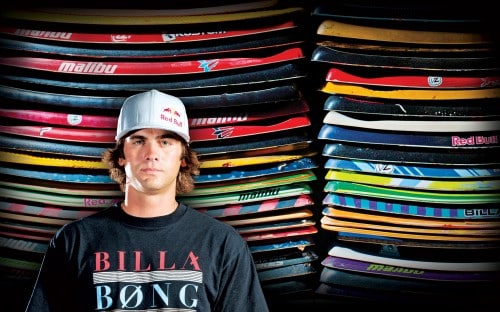
Words: Shawn Perry Photos: Aaron Katen
It may seem a little outlandish to talk about long-term careers in wakeskating. After all, the sport’s only been around for the last 10 years or so. The fact is, though, Brian Grubb has been a staple in wakeskating since it started to grow legs around the turn of the century. Back when everyone was riding wakeskates for fun in between wakeboard sets, Grubb was hanging up his wakeboard for good. At a time when nobody really took wakeskating seriously, he had the vision to see that it wouldn’t be the sideshow to his boot-strapping friends forever.
Ten years later, Grubb has stayed at the top of wakeskating through every ebb and flow. No matter what fad or trend was taking over wakeskating, Grubb went into every season with the same goal: learn new tricks and get them consistent. As a result of that resolve, Grubb is still at the top of the rankings at age 30, despite a wellspring of über-talented up-and-comers. And he has no intentions of letting off the gas anytime soon. Taking his cues from guys like Kelly Slater, who just won another world title at 38, Grubb is primed to push wakeskating well into the coming decade.
Let’s start off with the standard:
State your full name and where you are from. Brian Grubb from Orlando, Florida.
Do you remember the first time you rode a wakeskate?
Yeah, it was with my friend Patrick in high school. It was a waxed-up Flight 69. We saw Scott Byerly and those guys doing it, and Patrick had an extra board so we tried it. Just bare feet and wax out on Lake Butler. We didn’t do any shoves or anything, just carved around.
How old were you?
I was probably a sophomore, so like 15 or 16.
Were you wakeboarding before that?
Yep. The first time I wakeboarded was at a clinic with Darin Shapiro on Lake Ivanhoe. It was when I first moved to Florida when I was like 11. It was right when the Hyperlite Pro came out, which was the second really good compression-molded board. So yeah, I learned how to get up that day and could do one-wake jumps. I had water skied before that, but wakeboarding was the new thing. I got a board that Christmas.
When did you realize you wanted to only wakeskate? Was there a definitive moment or was it gradual?
I guess it was a little bit gradual. I started wakeboarding for Hyperlite in my senior year in high school, so I was super into it and always wanted to ride. I graduated high school and went up to FSU in Tallahassee, but I wound up coming back to Orlando quite a bit because there weren’t too many places to ride up there. After a year of that, I transferred to UCF in Orlando. So this was like ’99, right when Orlando Watersports Complex was opening. I went to X Games for Hyperlite and met Scott Byerly for the first time. He invited me to wakeskate at his house when we got back in town.
Did you wakeskate at the cable before that?
Yeah, back when there were no rails. I was working for Performance (Ski & Surf), so I’d ride every day on my lunch break. We built the first rails out there — the big red kicker and that ride-up flat bar. Once we had those, everyone was hitting them on their wakeboards, but I just started hitting them on my wakeskate. That’s when I really started having fun with it. The whole aspect of trying tricks no one had done before was really cool — just trying to think of new stuff.
Is that when you started riding with Scott?
Yeah, I looked up to him growing up, so to have something in common where he was actually calling me to come ride was the coolest thing ever. I think all of that together is what made me realize I was going to stop wakeboarding and put all my time into wakeskating.
Was that around the time of the john boat rail?
Yeah, exactly. That was one of the first things we built together.
How did it start with the Pointless Crew? First, you wakeboarded with those dudes, right? I remember you wakeboarding in Hype even before all that.
Yeah, Daily Dose was the first movie I ever had a small part in and then Hype. But when I got back into town in ’99 and started wakeskating we all started filming a lot for the Pointless stuff. The rest of the crew was all still in high school.
So that all went down at the same time?
For that whole year, I would pretty much ride with Scott in between classes at UCF during the day, finish up my classes and go to Danny Harf’s parents’ house and ride in the afternoon. In the evening, I’d drive down to Shane or Parks Bonifay’s house and edit for Incomplete or party or whatever. That went on for a while. Those were good times.
What was it like being the only wakeskater in the Pointless Crew?
It never was an issue, really. Those guys were just super into wakeboarding, and I got into wakeskating. They would always push me to do new stuff, and I got them out on wakeskates. They would have little contests to see who could do the first shove indy and stuff. They had fun with it. And guys like Erik Ruck and Parks got into wakeskating for a while too. They were building rails and wakeskating a ton. Everybody liked to do it — I just took it a little more seriously than everybody else.
How do you think riding with those guys shaped your riding?
It definitely helped me progress behind the boat a lot more. I was always riding big wakes and long lines right along with them. I think it really helped me get used to riding setups like that and getting my tricks consistent.
In the course of your career you’ve done some cool things. What sticks out in your head as the most fun thing wakeskating allowed you to do?
Oh, man. I definitely can’t pick one thing. Some of my more memorable trips were filming for the Billabong movie Out of the Pond. It was amazing. We got to go to Tahiti and Australia and the Philippines too. It was just cool because I grew up with everyone on the team, so to go around the world with my best friends was amazing. Wakeskatingwise, I’d have to say the trips to New Zealand that we used to do.
For Red Bull?
Yeah. We did like three of trips in a row. It was pretty much just me and the dudes from Cassette back then, like Danny Hampson, Aaron Reed and Thomas Horrell. The Red Bull guy down there, Ivan, is just super into wakeskating and would set up really cool things for us to do. Those trips were super fun. It was all wakeskating, and those guys had a different style than I did, so I liked riding with them. Before that, I never really got to ride with those guys a whole lot so to be there for 10 days with them was really fun. Especially the Human Trailers trip where we drove from Auckland to Christchurch. It was just all about finding fun stuff to do, winching the whole time. And New Zealand is an amazing place in itself.
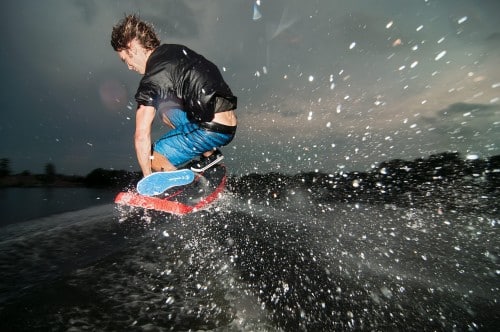
You come from an aeronautical family. Your dad was a fighter pilot. Did that have a lot to do with shaping who you are?
Yeah, I think so. I think my background has helped me follow my dreams; that’s for sure. Ever since I was little I wanted to be the best at whatever I did. I think I saw that drive in my dad because he was a fighter pilot in the Navy. Growing up, seeing the crazy photos and hearing the stories, I just always wanted to do something that was really exciting and on the edge of being gnarly. When he was growing up, being a fighter pilot was the craziest thing you could do, and he was one of the best in the country at it. He flew at Top Gun and was a great pilot. So I’ve just always wanted to be the best at everything I did, whether it was skiing, wakeboarding or wakeskating. I think it made me a really competitive person. I’m still like that now. My parents didn’t do the strict military upbringing or anything — they were supportive. But they taught me that if I’m going to put all this time into something, then I should try to be the best at it.
Inside the sport, wakeskating grows a lot on a regular basis. But from the outside looking in, the sport as a whole doesn’t seem to grow rapidly. More wakesurfers sell than wakeskates year after year, the number of contests stays the same and prize money has flattened out. What do you think it’s going to take to keep wakeskating growing?
That’s a really good question. I’ve been seeing all those things happening recently and ask myself that. I think wakeskating at its core level doesn’t really hit a huge demographic. It takes a lot of time to even learn how to do basic tricks and be consistent. Even with a skateboard or wakeboard background, it takes a little bit to just be comfortable riding. I just think a lot of people don’t want to put the time in, especially when they can go wakesurf and learn it in 15 minutes and go out in bad water with fewer consequences. I think that’s a barrier for wakeskating, but there are people like me and all the other serious guys who can’t get enough of it. We’re seriously obsessed with it and don’t think about anything else. It just takes a little more time to get past that first initial learning curve. Every trick just builds off one another. From a spectator sport perspective, the more people who see wakeskating will be interested in trying it. A lot of people don’t event know what it is. I mean, you’re at an airport and you can explain what wakeboarding is to some people and they are like, “Oh, that’s that thing behind the boat.” But you talk about wakeskating and they have no idea what you’re talking about. So I just don’t think that many people have seen it. And even when people do watch someone doing flip tricks or anything, they have no idea how hard it actually is. Wakeskating has so much potential. It’s just all about getting people to see it in a way that makes them want to try it.
Yeah, that’s the challenge.
You watch what those guys do on Street League, and they make it look so easy and so fun, but those guys are machines. What they are doing is so hard. I think from the outside looking in, that’s what wakeskating looks like on a much, much smaller scale. It’s super-technical, but if you put the time into it you can get really good at it. Hopefully more and more people just see it and get into it, like old guys who just want to cruise around without being strapped in, if they have bad knees or whatever. It’s fun.
You’ve had longevity with the majority of your sponsors — Hyperlite, Billabong, Malibu, Performance and Red Bull. What have you done right to keep these guys constantly happy to support you?
Well, I think the biggest thing is I try to do better and do more every year. Obviously, I’ve had the best opportunities with my sponsors because they’ve been so supportive even when wakeskating wasn’t a sport. I mean, Red Bull has been there for 10 years, starting when wakeskating was nothing. But I think doing well at contests is important to them, being on the podium and getting coverage on TV and in the magazines and just getting exposure for them, you know? I also think a big thing that helps a lot is just being readily available to my sponsors, whether it be for clinics, boat shows or trips. I’ve tried to never turn down an opportunity I’ve had from my sponsors. You never know what that could lead to in the future. You could do that trip and something later comes down the road that you would never have known about. I’ve always just tried to take advantage of the opportunities that present themselves. I think I’ve been able to build off those relationships so when something else comes up, they think of me. Most of all, my sponsors enable me to live my dream of riding all year and all over the world, so for me to go do a boat show for a weekend or teach kids how to ride is great. It’s just a big opportunity to make wakeskating grow and to help the brand I’m working for accomplish what it needs to.
You’re one of the few wakeskaters with a boat sponsor and a free boat. In a world where a lot of kids are learning and riding behind PWCs and winches, where do you see boats fitting in for the future?
I think wakeskating’s roots are always going to be behind the boat. That’s where it started. But, riding behind a PWC and winching and stuff is like a totally different style.
And cable?
Yeah, and cable too. I think boat is the most different, though. I don’t want to make the analogy of riding boat and comparing it to vert skating, but it’s just a different style. When you ride boat, you’re going faster and going higher in the air, whereas behind the PWC and cable is just more technical. There’s always going to be both. Wakeskating is wakeskating, whether you’re behind a boat, cable or winch. You’re going to ride what you like and what’s more accessible. I mean, in wakeboarding, you have to have a huge boat with a big wake. One of the major benefits to wakeskating is you can go behind anything with minimal horsepower and have fun. It’s just more accessible. Cable is great because it helps your consistency. I remember growing up and being at OWC and just doing lap after lap. It’s getting your consistency down. As fast as you can get back to the dock, you’re back on the water. I think that’s where wakeskating is going to see serious growth with all the new parks opening. If you have good rails, it’s just like a skate park, and you can have a ton of fun riding with your friends.
Where do you want to get better?
I’ve always wanted to get better at flip tricks. I can do a few of them, and some days I can be consistent with them. But some days I go out and can hardly do any of them. It’s frustrating because behind the boat I’ve always been pretty consistent. I can usually do a lot of my tricks. Riding behind the PWC, I’m consistent with all my shove and big spin stuff, but flip tricks I’m just so hit or miss. I watch videos of guys riding like Ben Horan and Andrew Pastura and Reed Hansen just doing sick lines behind the ski and getting really tech on rails and stuff. It’s just so fun to watch. It’s a totally different style to how I ride, but I look up to it. It’s cool to see those guys take it to a whole new level. We all knew it would happen. Scott and I used to talk about where wakeskating is gonna go and a lot of it is already there and it’s only 10 years old.
Yeah, we joke about people 3 flipping the wake.
I know, and heel flipping consistently and doing them down drops! It’s gotten to a level now that is just so insane to watch. I don’t know how a skateboarder or anyone who wants to hate on wakeskating could say anything after seeing that.
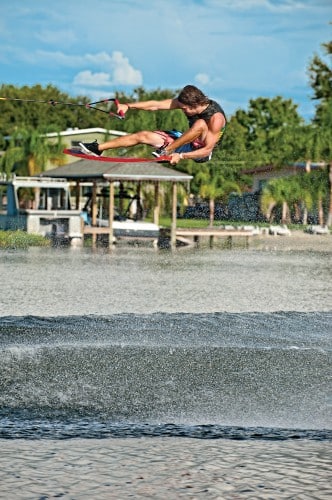
You’re known as somewhat of a contest rider, and you’re a judge on the Pro Tour, but you’ve never put on your own event. Do you ever want to organize your own contest like Scott, Aaron or Ben has done?
Yeah, I’ve always talked about it, and I’ve always had my own ideas on format and how I would do it. Some of those ideas have actually transferred over to the Pro Wakeboard Tour this year, just because I’ve been a wakeboard judge for so long and we always have meetings in the offseason about how we think it should run and what would work. I always said if I did a contest it would be a multirun format, kind of like what we’re doing on the PWT with no falls. So when you fall you’re done, but you can go out there and try to link some tricks together, like a vert or super-pipe run. You could go out and fall and pump back up to the top, but you’re not going to win the event. It would really just boost consistent good runs but still have the difficulty to win with the two runs. I don’t know, I’ve helped Scott with Toe Jam over the years, and he puts a ton of time into it. It’s not just showing up and getting a few people to judge. It’s a ton of work. He’s already been at The Projects for 10 days, and the Toe Jam is in two weeks, you know? You have to build the site and line up the sponsors. Scott has a lot of help, but you see him on Toe Jam weekend and he’s done at that point. He’s been working so hard to make it happen, it’s his time to sit back and enjoy. Right now, I’m just so busy with riding and trips and judging a lot. It would be really hard for me to plan an event at this point in my career.
What are your biggest influences outside of wakeskating?
My biggest influence from another board sport would probably be surfing. I like to surf, but I look up to guys like Kelly Slater and Andy Irons. I think some of the things you can do on a wakeskate are surf-based, a lot are skateboard-based too, but just being fluid and linking stuff together, I think you can learn a lot from surfing. I also admire the mental toughness of those guys. Watching their tour, I feel like they have to surf a ton of heats in so many different conditions. You can throw them in any wave, and they’re going to do well. I’ve always looked up to that, especially since I’m getting older. Watching Slater get better and better in his late-30s is inspiring. It just proves you can be in your prime and hit your stride when you want to. I feel like that too. I’ve been doing it for 10 years or whatever, and the equipment has gotten better, I’ve gotten stronger and more consistent and the wakes are better than ever. I couldn’t do nearly the tricks I used to all because our boards were too light. The whole industry has learned a lot about what boards work in different situations. I no longer ride the same board in everything I do. Before, I had one board for everything. Now, I ride a wood deck behind the ski and the cable because I feel like it has better swing weight and sits deeper in the water. My model G is obviously what I ride on the wake and sometimes on rails.
What about within the sport? Who do you think is currently on the forefront of making wakeskating what it is?
I’ve looked up to a lot of people over the years. Obviously, watching Scott wakeboard and wakeskate motivates me even to this day. Brandon Thomas has been living with me for about five years now, and we ride together on a regular basis. Before that, he didn’t really ride boat a whole lot, but now he’s one of the best boat riders in the world. So it’s been really fun to have him to ride with, and we have a great time pushing each other. I really enjoy watching Ben ride. He just has a real skate style and a real unique style and does super-hard tricks. He skateboards really well, and for him it just translates straight to the water. He doesn’t come from a wakeboard or water ski background at all, and I think that’s pretty cool. Andrew Pastura and his brother Austin too, seeing what they did with their pool setup at the house, it’s really cool and now they’re so consistent. Reed Hansen is probably the most consistent with contest and free-riding. He’s kind of the guy who does it all: super-good behind the boat, on the cable, rails, anything. He’s fun to watch but tough to ride against. He’s been doing some cool stuff this year too. It’s going to be interesting to see Move of the Year at Wake Awards this year to see what everyone does. It’s always amazing. You just sit there with your jaw dropped, watching tricks you didn’t even know they were doing. I mean, there are a ton of guys who I look up to in wakeskating. Those are just some of the guys who are pushing it and out there doing different stuff and doing their thing, but it all helps wakeskating.
What do you like to do when you’re not on the water?
I try to enjoy my time off the water as much as I can. Here in Florida, we golf quite a bit. A few of us all skydive pretty frequently — Parks, Adam Errington, Aaron Rathy and a couple others. We all got certified.
How long have you been certified?
About three years. I really just got into skydiving through bungee jumping, though. I’ve been jumping with the Vertigo guys out in Washington for about 10 years. Scott introduced me to them. I love it; it’s super fun. You go out and jump in the middle of the night, and it just gets you in the zone. Half of it is the adrenaline of jumping and the other half is knowing you’re not supposed to be there. It’s just this crazy feeling. You’re on a bridge that’s 300 feet off the ground and just waiting is exciting because you’re not strapped in or anything. You’re always watching your step. Obviously, jumping is the best part, but the entire experience is really cool and addicting. Any time those guys do a jump trip, I do whatever I can to get out there. I’ve been lucky enough to do some amazing jumps on some amazing bridges with those guys.
At one point didn’t you have the world record, for like a day?
Well, it’s an unofficial world record. But yeah, back in ’07 we went to the Royal Gorge in Colorado. It’s the biggest bridge in the Untied States. It’s almost 1,000 feet tall. I flew out there for a day to do it, right before Surf Expo and Wake Awards. It was weird, though. It was getting toward the end of the day, and there was this truck there that can drive on the train tracks in case anyone got hurt. It was supposed to be there until 5 p.m., but at 3 p.m. they said it needed to leave. I was so bummed. I flew all the way out there and I wasn’t going to jump. But they talked the truck into staying for another jump, and I was standing over the edge. We were trying to go as deep as we could; it’s like 950 feet or something. Normally I would do some squirrel or something with my arms and legs out, but I said to myself, “I’m just going to point it” and went down headfirst with my arms back. That was the first time I really ever felt a total free fall. I was pointing straight down and carving back and forth through the air. I was like, “This is insane.”
How long is the free fall?
It was like nine seconds until the cords start tightening up. There is a river on one side and a train track that’s raised on one side. We had some spotters down below, and I went to about the train track level, which is about 20 feet off the river bottom. Obviously, the rebounds were massive and it was the best jump ever, but I went deeper than anyone had gone off that bridge. So yeah, for like a day I had the unofficial world record. There are bigger bridges in China, but no one has jumped them. We figured it was the highest bungee jump someone has done off a stationary object. People have gone bigger out of like helicopters and hot air balloons, but off a stationary object, it was the highest one. The next day, though, my friend from Vertigo went out and went deeper, so I only had the record for a second. After that is when I started looking into getting certified for skydiving. That feeling was crazy.
So that was like a gateway drug.
Yeah, pretty much. There are no bridges in Florida, and that was a pretty cool feeling so I knew I needed to get certified.
If you weren’t wakeskating for a living, what would you be doing?
I don’t know. I might be flying like my Dad did. I’ve never had any desire to go into the military like he did, but I’ve always loved flying.
Would you ever get your pilot’s license just for fun?
Yeah, I’ve thought about doing it. I’ve had the chance to get my license when my Dad was teaching but just never did. I think down the road I could get into that. I don’t know what I’d be doing if I wasn’t wakeskating. I got my degree from UCF. I stayed in school in the anticipation that if something didn’t happen with wakeskating I’d have something to fall back on. Who knows if I’ll ever use it, but we’ll see.

